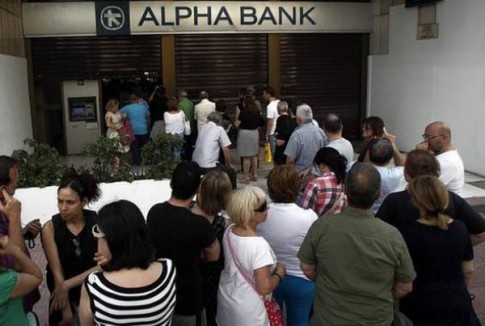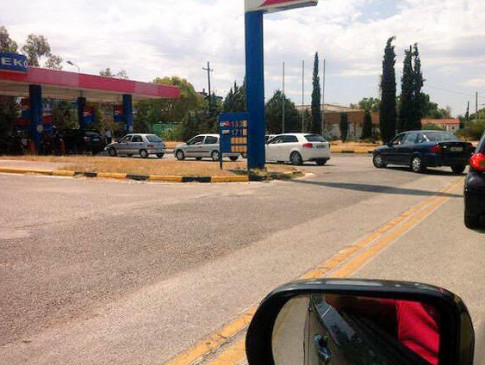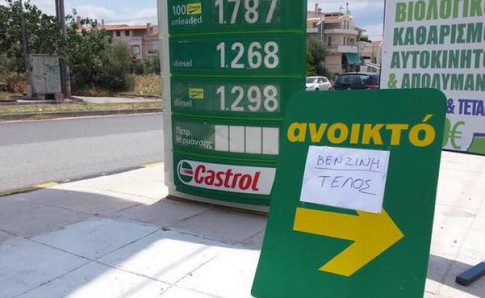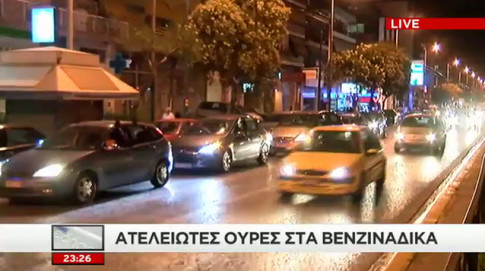– Ignoring Tsipras Plea For Calm, Greeks Storm ATMs, Stores, Gas Stations (ZeroHedge, June 28, 2015):
Just a few hours ago Greek PM Tsipras addressed his nation imploring then to “remain calm” and reassuring them that their “deposits were safe.” It appears the Greeks did not believe him. Many were wondering where the Greek bank lines were for the past several months. Turns out the local depositors were merely waiting until just after the last minute to withdraw their funds… horde gas… and stack food. Greece, it appears is Venezuela – the new socialist paradise.
Tsipras implored: “Keep Calm….”
They did not listen…
Call that an ATM line…
Now THIS is an ATM line…
This ia an ATM queue in the centre of Athens now #Greece#Greferendumpic.twitter.com/lx12DYnJIW
— Loukia Gyftopoulou (@loukia_g) June 28, 2015
??????? ????????????. ??????. pic.twitter.com/pPy1HT5LaP
— Kosmas Themelis (@kosmasthem) June 28, 2015
How Greece looks like after capital control announcement by SYRIZA-ANEL #europe#euro#Eurozone#EuropeanUnionpic.twitter.com/x6nK9951H1
— Poseidon (@Kons_u) June 28, 2015
#ATM#thessaloniki#greece#krisis pic.twitter.com/Ly4g8B0Paj
— ????? ? (@sissy_mitr) June 28, 2015
Lines outside ATM in #Thessaloniki this evening via @gatosg. #greece#athens#Greferendum#dimopsifismapic.twitter.com/phf1050KMG
— Omaira Gill (@OmairaGill) June 28, 2015
ATM queues growing by the hour in #Greece. #euro#GreeceCrisispic.twitter.com/IYx9KAyr2n
— New Europe Investor (@neweuropeinvest) June 28, 2015
Even at the airports…
Resending this as there is at least one other ATM with cash at athens airport out of shot. I’ve joined the line. pic.twitter.com/EuoIcj9afb
— Elliott Gotkine (@ElliottGotkine) June 28, 2015
And gas stations are overwhelmed…
Scene at the petrol station near my hotel. Busy, certainly. but not manic. #Greece#europic.twitter.com/zEODyhbkHk
— John Hooper (@john_hooper) June 27, 2015
As grocery stores and general appliance stores come under seige…
???????? ??????? ???????, ????. ???? ??? ???? ?????????… pic.twitter.com/mWU7DHkl99
— ???????????????????? (@LPapastergiou) June 28, 2015
We have seen this before – in Russia recently as the Ruble collapsed and citizens spent any and every piece of currency they had on ‘assets’.
The great news for Greece is that GDP for Q2 will be sent soaring.
Simply put – it’s all about inflation expectations. And unlike The Fed or The BoJ, who keep trying to jawbone higher expectations into their citizens’ minds, the Greek government may have achieved it implicitly through devaluation expectations and with it – a spending spree before things get more expensive and implicitly a surge in GDP. Of course, however, the spending surge can only be short-term and will stop as soon as there are no more euros to spend.
Europe – The Final Countdown








Impressive pictures.
The BoJ and the FED can only jawbone because they don’t dare raise interest rates……………..they can’t. There is nothing behind them but smoke and mirrors, just like the ECB, IMF……there is nothing left in the markets to sell but debt, and that is what they have been doing.
Greece has the Euro over a barrel…if they let them default or depart, the weakness in the four nations who underwrote 98% of Greek debt, Germany, France, Italy and Spain, will be the next to have their weak financial state exposed to the world. All they have behind them is smoke, mirrors and debt.
If the Euro sees Germany, France, Spain and Italy as their strongest members, they are on life support already.
Italy and Spain nearly collapsed in the past 24 months….
How can they underwrite Greece?
Madness.
Looks like the Greeks are behind their prime minister……Check out this story, they realize this debt can never be repaid…….Default is growing in popularity…..
http://rt.com/news/269026-greece-bank-debt-crisis/
Greek banks closed for a week, already shaking US, Japan and Euro markets…..
Looks like this is beginning to get serious…..
http://www.theguardian.com/world/2015/jun/29/greece-crisis-markets-begin-to-tumble-as-investors-flee
Text of Greek PM comment to Economic Forum in St. Petersburg. I don’t know if you posted it at the time, just found it on UK Guardian. It is worth reading, and makes a lot of sense. Included are a couple of responses to his comments. All worth reading.
Greek Prime Minister Alexis Tsipras’ statement at the Economic Forum in St. Petersburg
June 19, 2015 | categories : Articles and Statements, Speeches
I would like to thank the organizers for the great honor of inviting me to participate in this important event at the International Economic Forum in St. Petersburg.
Many of you may be wondering why I am here today and not in Brussels negotiating. However, I am here, exactly because I think that a country that wants to examine and explore possibilities for succeeding, must have a multidimensional policy and engage with countries that are currently playing a key role in global economic developments.
The economic circumstances that resulted from the global crisis’ eruption in 2008 have led to a very different world.
In Europe, we had long been under the illusion that we were the center of the world, taking into consideration only those developments occurring just beyond the borders of our neighborhood to the other side of the Atlantic.
The world’s economic center of gravity, however, has shifted.
New emerging powers are playing an increasingly important role–economically and geopolitically.
International relations are acquiring an increasingly multipolar nature. The role of the G20, the upgrading of the regional cooperation processes in Asia, Latin America, and Africa, as well as the strengthening of cooperation between the BRICS countries are irrefutable proof of the emerging new economic world.
Moreover, the Eurasian Union–this relatively new project for regional economic integration–is potentially another source of new wealth production and economic power.
However, these changes do not, in and of themselves, lead to a more peaceful or a stable world.
The existing significant social challenges remain, including poverty, unemployment and social marginalization, while regional conflicts, crises and tensions are intensifying. In the Middle East, Africa, the Black Sea region.
And in this sense, the great challenge of this new era is whether the shift in the global economic center of gravity will generate new possibilities for addressing these global social challenges and inequalities, or whether it will accelerate the uncontrolled course of the global economy–aptly described as a “casino-economy” by the former President of the European Commission, Jacques Delors, shortly before the resounding economic collapse in 2008.
For the old financial center, particularly for Europe and the Western world, the challenge will be whether it chooses to react positively to new challenges by building bridges of cooperation with the emerging world, or whether it will remain committed to old doctrines, raising new walls of geopolitical conflicts.
The crisis in Ukraine, for example, opened a new wound of destabilization in the heart of Europe, a bad omen for international developments. Instead of greater economic and political cooperation in the region, there is a revival of an obsolete Cold War. Which leads to a vicious cycle of aggressive rhetoric, militarization and trade sanctions.
This vicious cycle must come to an end as quickly as possible; diplomatic initiatives, such as implementing the Minsk Agreement, are valuable and should be supported.
My country, Greece, is located in the geographical center of many of these crises and tensions; nevertheless, it maintains its role as a pole of stability and security in the region. As a European, Mediterranean and Balkan country, as well as one belonging to the wider Black Sea neighborhood, Greece seeks to be a bridge of cooperation in its region. To become a hub of investment, trade, energy cooperation, transport, tourism, cultural and educational exchanges at the crossroads of three continents.
Reply
Report
Patlogan34 Patlogan34
9m ago
0 1
We intend to capitalize on our participation in all international bodies that we are members of as a European country.
While fully respecting our commitments as such, we will also actively seek to become a bridge of cooperation both in our region and beyond, with our traditional friends such as Russia, but also with new global and regional organizations.
Of course, as you are all undoubtedly aware, we are currently in the middle of a storm. But we are a seafaring people, well-versed in weathering storms and unafraid of sailing in large seas, in new seas, in order to reach new and more secure ports.
Friends,
The problem that we, and our partners in the EU are facing hinges on the developments I have described. The EU, of which Greece is a member, must rediscover its true course by returning to its founding statutory principles and declarations: Solidarity, democracy, social justice. This will be impossible, though, if the EU persists with austerity policies and the disruption of social cohesion, which only serve to further the recession.
Let us not fool ourselves: the so-called Greek problem is not a Greek problem. It is a European problem. The problem is not Greece. The problem is the Eurozone, and its very structure.
And the question remains, whether the EU will allow room for growth, social cohesion and prosperity. Whether it will allow room for political solidarity instead of policies imposing dead ends and failed projects.
Dear Friends,
The emerging new multipolar world will truly be innovative and pioneering if it can free itself of the root problems fueling the global crisis. But this cannot occur–it has never occurred in history–without bold decisions. We cannot move forward in this new world while still carrying the burdens of our past mistakes. Otherwise, we will be doomed to repeat them and we will continue to fail–whereas the challenge for us is to change in order to succeed. To face new challenges and overcome them. Thank you very much.